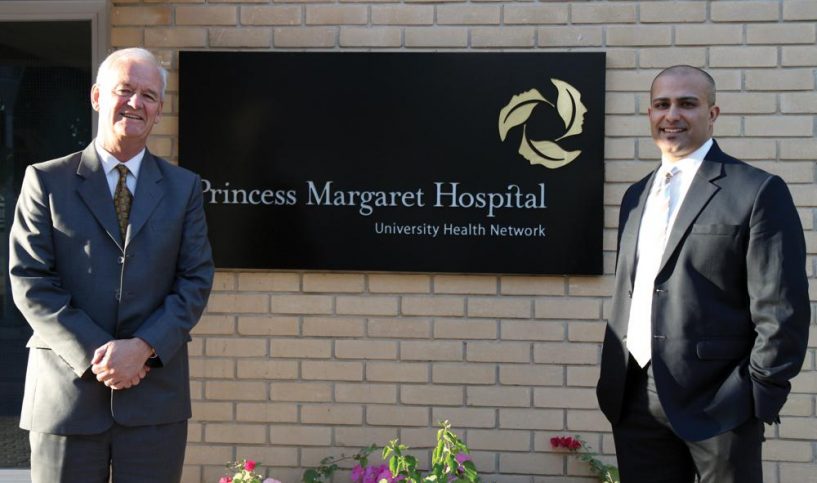In September, 2010, the University Health Network signed a five-year agreement for a fee of KD 37 million with the Ministry of Health of the State of Kuwait which will see UHN providing clinical expertise to the Kuwait Cancer Control Centre (KCCC) and to improve access to quality cancer services for the local population. Delighted with this news, we thought to ourselves, how else could we help? How can people get involved in this amazing feat? Perhaps many can consider this a drop in the sea, yet for anyone who’s had a run with cancer in any form—this is a ray of hope. Meeting with Mr. Adil Khalfan could only be described as an enlightening experience. For, not only does he have extensive experience in the field of quality improvement, strategy development, performance management and international health care, he is an exemplary source of leadership and an inspiration in the field of cancer care.
As we sat down with Adil and the UHN team, located right next to the KCCC in the Al Sabah Hospitals complex, we thought about the basic way in which cancer is handled in Kuwait. How does a healthcare professional even begin to break the news to a patient? He states, “It’s hard for any healthcare professional to break that kind of boundary with any patient, as well as to be mindful of their ability to process that information in that instant of time, their education level, and their comfort level in this specific area. Delivering bad news is a skill that every health practitioner has to learn, and practice. Once they do that, they also need to inform the patient that help is available. This ability, truly, takes years to hone, and we wouldn’t simply bring this specialization to KCCC without building the foundation and the desired philosophy for it, and this requires an evolutionary code of conduct to happen.”
What is the University Health Network?
The UHN is a network of four highly specialized hospitals in Canada. We have Toronto General Hospital that specializes in transplant care; cardiac care, surgical and ICU care along with emergency and general medical care. Within those areas, because of our research and university affiliations, we have specific areas of concentration within each specialized program. Then there is Princess Margaret, which specializes in oncology and palliative care services. For instance, we would have a complete program dedicated to prostate cancer, with nurses trained specifically in that field. Thirdly, we have Toronto Western Hospital that concentrates on neurosciences, neurosurgery, orthopedics, community health, and finally Toronto Rehab that looks at all rehabilitation treatments. These hospitals are all co-located, and have evolved over the years in terms of complimenting one another. Being a regional center in Canada, we were able to cross a lot of medical milestones, like pioneering stem cell discovery, the discovery of insulin, and the first double lung transplant. These are all world-firsts; we invent, test, adapt and streamline.
The agreement between the UHN and Kuwait is outlined through a five-year plan. What are the main objectives of the plan?
Essentially, the five-year plan is to enhance the cancer services of Kuwait through the use of UHN/PMH’s leadership in the area of Cancer Care. In order to achieve this distal goal there are 9 key elements of focus. Some of the key elements include knowledge-transfer, and making sure that the most up-to-date protocols and guidelines of the treatment of cancer are applied here at the KCCC. We aim to provide the KCCC with the wealth of information that we have accumulated over the years in terms of patient-care and the most advanced and effective treatment regimes. We don’t have to reinvent anything; our protocols simply need to be ‘Arabized’ within the Kuwaiti setting. Another objective is improving lab services; you can’t have a good cancer system without proper diagnostics including imaging systems. Looking at how the teams organize themselves is integral in providing multidisciplinary care to put a proper plan in place, because every patient is different. Clinical specialization is another objective of ours, and developing a humane, palliative care plan, because no one likes to think about the end of life, yet it’s very important. We need to present an end of life that shows dignity and resolution within the cultural context. We’ve also concentrated on specialized nursing specifically for those who are afflicted with cancer. We have also been given the opportunity to advise the Kuwait Ministry of Health on what is required in terms of a responsive and robust Information Management System for Cancer Care. They are currently evaluating this roadmap and evaluating how it fits with Kuwait’s larger National Health IT vision. I am most excited about helping KCCC develop, implement and sustain a healthcare quality-improvement system so that we can continuously improve the provision of safe, accredited care, and develope a high level strategic plan for cancer care in Kuwait. These 9 key elements will help both Kuwait and Canada reach their ultimate goal of enhancing cancer services in Kuwait for Kuwait and the GCC. Our aim, hopefully in the future, is that the patient becomes the center of his or her treatment plan, patient-centric care, where everybody’s expertise complements the patient’s best interest with the most effective and cutting edge care.
Are there any initiatives that are already underway?
Over the past year, we realized that the centre’s quality system needs updating, revitalization and improvement, and we are very happy that the MOH has sought out to undergo an accreditation process for all the public hospitals in Kuwait. This shows real commitment of the Government to enhance the care available for Kuwaitis in Kuwait. It is our role to help the KCCC, and the MOH, pass accreditation for both the general hospital and specialized oncology standards of accreditation.
Given your extensive research in the development and management of accountability agreements between hospitals and the MOH abroad, what is your view of the local system of communication, and accountability, between hospitals and the MOH in Kuwait?
Accountability is a critical aspect of ensuring an effective and efficient public health system. There are numerous policies and procedures in Kuwait to ensure the appropriate checks and balances are in place, based on what I’ve observed so far. However, I am not to sure that the policies and procedures currently in place encourage a more team-based, multi-disciplinary, multi-professional approach to treatment. Furthermore, the current system, at times, may not be responsive to changing healthcare needs and the availability of important supplies and equipment needed for care. I am not saying that these supplies are not made available but the timeliness in which they are provided needs to be re-evaluated. We need to change the philosophy to focus on what is needed for the better outcome of the patient rather than adhering to historic policies and procedures that are not responsive to current medical practice. Part of this is shifting the attention from doing simple counts to focusing on treatment outcomes and the factors involved in creating better outcomes. This may involve re-evaluating some of MOH policies and procedures, namely those that impact supplies and equipment tendering.
Furthermore, accountably is multi-faceted, with factors including efficiency, appropriate use of resources, a safety plan, a way to audit and a way to prove positive outcomes. Using high level strategic planning, we will be able to identify specific goals and objectives, and create the key performance indicators to measure positive outcomes over the next ten or twelve years, even after our partnership is done. This goes against the concept of how much money is saved, versus how the money is spent.
What changes are happening at the Kuwait Cancer Control Center, KCCC, in terms of patient-care activities, including radiation medicine, medical oncology, and surgical oncology?
We’ve spent the last year observing, and planning out strategies for the KCCC, and while that may seem overwhelming, it is absolutely essential for us in order to be better equipped to improve cancer-care activities. We’re also implementing rigorous engagement programs, whereby, every month, a team specialized in a certain type of cancer flies in to work with the KCCC teams in providing more information, assessment, and modeling multidisciplinary approaches through training and educational lectures in disease-specific care. They also provide their recommendations and strategic direction as to where we are headed with this partnership. They will come here for this period of five years in order to build a relationship with the KCCC. New IT plans are in place, yet they are pending approvals from the concerned ministries. We’re working towards empowering physicians to better handle patients, and we’ve been impressed with the KCCC’s need and desire to better themselves. We’ve already seen a difference in the nursing staff and their knowledge of cancer-specific nursing through the UHN/De Souza Nursing curriculum. We have helped to implement a surgical checklist so that we can improve safety in the Operating theatre as well as enhance team function within the OR. We have provided numerous second opinions and consultations for our KCCC medical staff through the partnership without having to travel abroad for world-class care. In some instances where there is a very complex case, UHN/PMH has treated patients in Toronto. A further benefit of the partnership is that when these patients return to Kuwait after treatment in Toronto, they are cared for with the same protocols and guidelines in Kuwait upon their return.
How will the UHN enrich the general knowledge of Kuwait’s citizens about cancer? Is there a support system being put in place for cancer patients in Kuwait, as well as their relatives?
We were very excited to see the strong family ties that is characteristic of Kuwait. While they may know very little, or sometimes too much, whereby they sometimes hide integral information from a patient who needs to know, they are definitely very involved and the best part is that we can leverage this strong security net that is familial support. It is really up to us as a medical community, and the MOH, to change the stigma of cancer in Kuwait. It’s so important for our generation to start to change that mindset of our parents and our grandparents, and instead, mobilize as a family unit to get through cancer together. Besides that, we are focused on bettering clinical care, especially in specialized nursing and developing surgical checklists that are compatible with the WHO’s standards. Besides technical organization, the surgical checklists aid in increasing teamwork, where the whole surgical team knows one another on a personal level.
Can volunteers join the different programs and initiatives conducted by the UHN in Kuwait?
Part of our public relations and engagement plan includes a broader awareness of cancer. This isn’t going to happen right away, and we’re working on getting in touch with more of the not-for-profit organizations to better coordinate activities which would involve the general public, especially volunteers. If people want to volunteer, we would happily meet with them and see how they would like to get involved.
To get in touch with UHN in Kuwait, feel free to email Adil Khalfan at adil.khalfan@uhn.ca, or Ms. Viva Nsair at viva.nsair@uhn.ca.











